The Historic 'Napalm Girl' Pulitzer Image Marks Its 40th Anniversary
Forty years ago, June 8, 1972, an Associated Press photographer, Nick Ut, was shooting photos outside of Trang Bang village, South Vietnam, when South Vietnamese planes accidentally dropped napalm bombs on Trang Bang, which had been occupied by North Vietnamese troops.
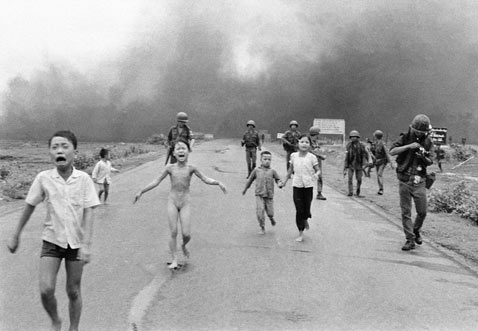
The children from left to right are: Phan Thanh Tam, younger brother of Kim Phuc, who lost an eye, Phan Thanh Phouc, youngest brother of Kim Phuc, Kim Phuc, and Kim's cousins Ho Van Bon, and Ho Thi Ting. Behind them are soldiers of the Vietnam Army 25th Division, June 8, 1972. (Nick Ut/AP Photo)
Nine-year-old Kim Phuc was with a group of civilians trying to flee the village when the planes mistook them for soldiers and bombed them with naplam. Ut captured Kim Phuc and others running out of the bombed village. She was naked from having her clothes burned off. Ut and some other journalists quickly ran to help the burned villagers, saving Kim's life.
4o years later, Ut and Kim still stay in touch, and because of this tragic yet infamous picture their lives have become intertwined forever. Ut won a Pulitzer Prize for Spot News Photography in 1973 for his 1972 Associated Press photograph of Phan Thi Kim Phuc.
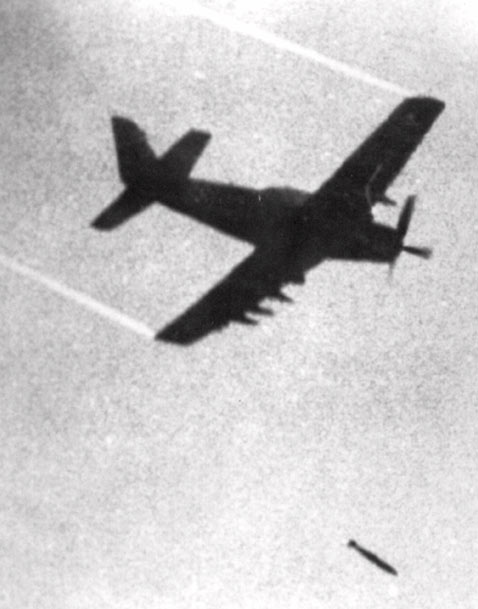
In this June 8, 1972, photo taken by Associated Press photographer Huynh Cong "Nick" Ut, a Skyraider, a propeller-driven plane of the Vietnamese Air Force (VNAF) 518th Squadron, drops one bomb with incendiary napalm and white phosphorus jelly over Trang Bang village. (Nick Ut/AP Photo)
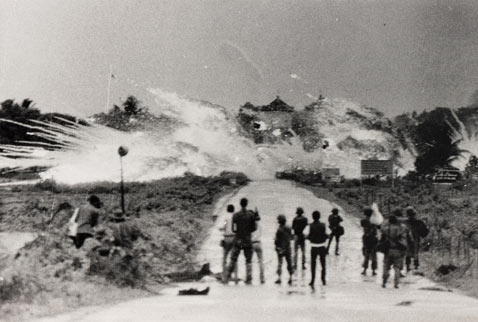
Bombs with a mixture of napalm and white phosphorus jelly dropped by Vietnamese Air Force Skyraider bombers explode across Route 1, amid homes and in front of the Cao Dai temple on the outskirts of Trang Bang, Vietnam, June 8, 1972. (Nick Ut/AP Photo)
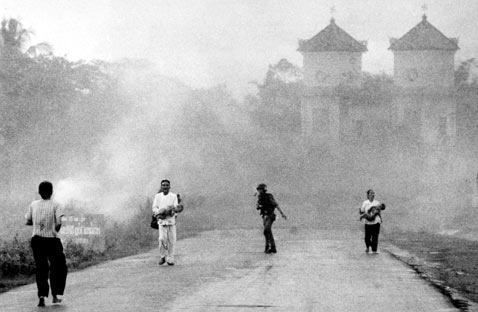
A Vietnamese man and woman carry severely burned children down Route 1 after a misdirected napalm attack by South Vietnamese pilots in the village of Trang Bang, South Vietnam. The aerial attack was intended for enemy forces on the outskirts of the village, June 8, 1972. The temple, seen in the background is still there today. That's where Kim Phuc and her family, along with other villagers, were inside, thinking they were safe from the conflict. The children in this image did not survive. (Nick Ut/AP Photo)
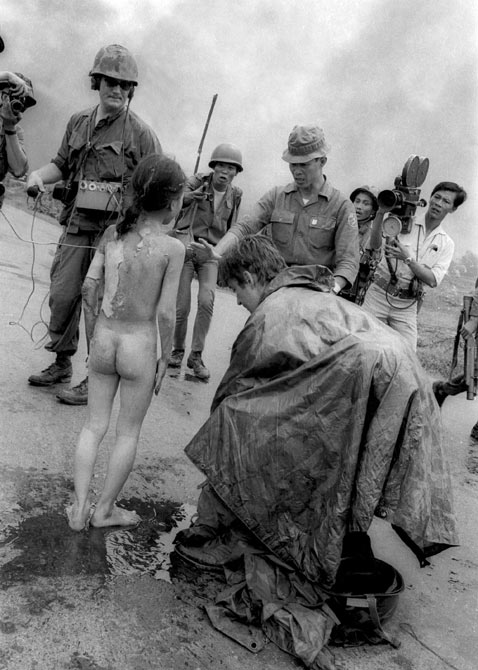
Nick Ut took this image seconds after his famous shot, of Kim Phuc running down the street. Television crews and South Vietnamese troops surround 9-year-old Kim Phuc on Route 1 near Trang Bang, South Vietnam, after she was burned by a misdirected aerial napalm attack, June 8, 1972. (Nick Ut/AP)
In an interview with KABC7 LA, Nick Ut described the scene: "I keep shooting, shooting pictures of Kim running. Then when she passed my camera, I saw her body burned so badly, I said, 'Oh my God, I don't want no more pictures.' She was screaming and crying. She just said, 'I'm dying, I'm dying, I'm dying,' and, 'I need some water, bring water.' Right away, [I] run and put water on her body. I want to help her. I say no more pictures, I want to help Kim Phuc right away."
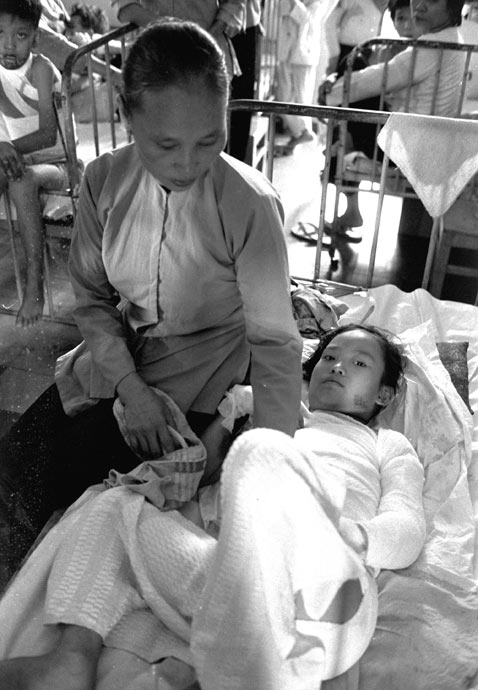
Phan Tai Kim Phuc, 9, is comforted by her mother in a Saigon, Vietnam, hospital, two days after she was severely burned during a misplaced napalm attack on her village, June 10, 1972.(Robinson/AP Photo)
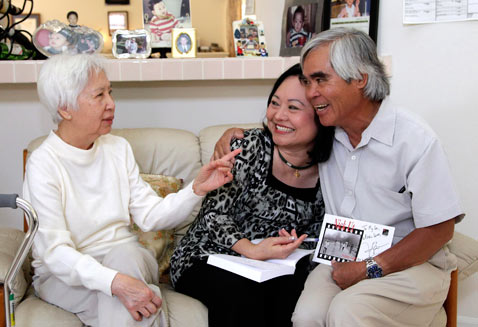
From right, Associated Press staff photographer Nick Ut, Phan Thi Kim Phuc and Dr. My Le, who treated Kim Phuc two days after a napalm attack in Vietnam 40 years ago, sit together during a reunion in Buena Park, Calif., June 2, 2012. (Jae C. Hong/AP Photo)
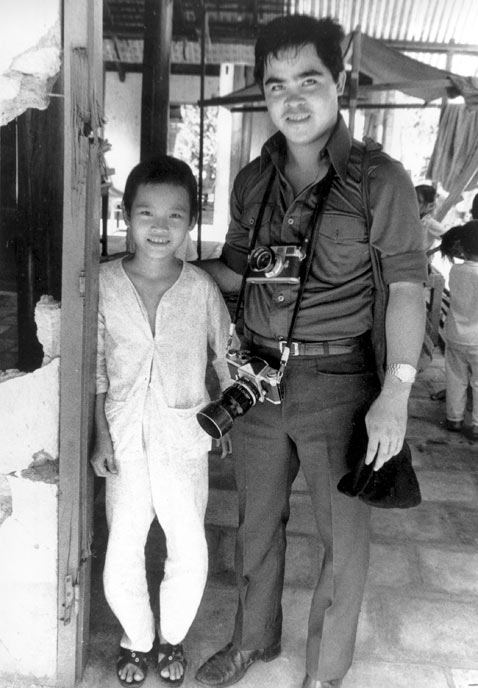
Phan Thi Kim Phuc, left, is visited by Associated Press photographer Nick Ut at her home in Trang Bang, Vietnam, 1973. As a nine-year-old, Kim Phuc was the subject of a Pulitzer Prize-winning photo by Ut as she fled in pain from a misdirected napalm attack against her village by South Vietnamese planes in 1972. After taking the photograph, Ut came to the girl's aid and transported her to a hospital. (AP Photo)
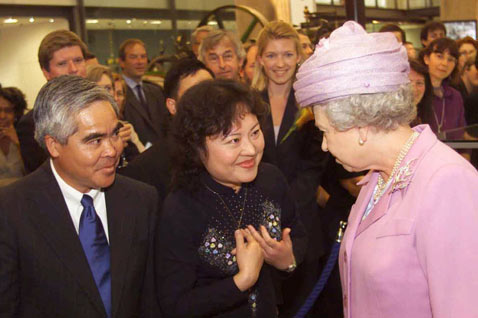
Britain's Queen Elizabeth II, right, opens the new Welcome Wing of London 's Science Museum with Associated Press photographer Nick Ut, left and Phan Thi Kim Phuc, center, June 27, 2000. Ut's image of Kim is featured in the museum. (Ian Jones/AP Photo)
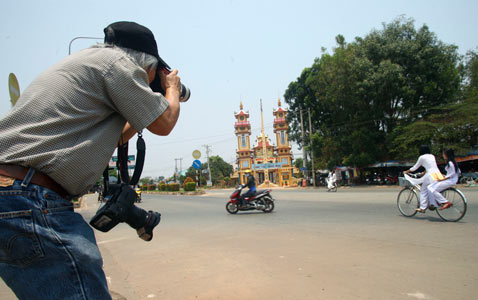
Huynh Cong "Nick" Ut takes a photo of schoolgirls cycling near the place where he took his famous Pulitzer Prize-winning photograph of 9-year-old napalm victim Kim Phuc 40 years ago in Trang Bang, Tay Ninh province, Vietnam, March 29, 2012. (Na Son Nguyen/AP Photo)
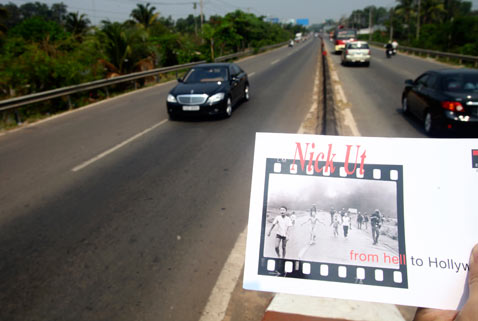
A copy of the Pulitzer Prize winning photograph by Associated Press photographer Huynh Cong "Nick" Ut is held at the place he took it 40 years ago in Trang Bang, Tay Ninh province, Vietnam, March 29, 2012. (Na Son Nguyen/AP Photo)
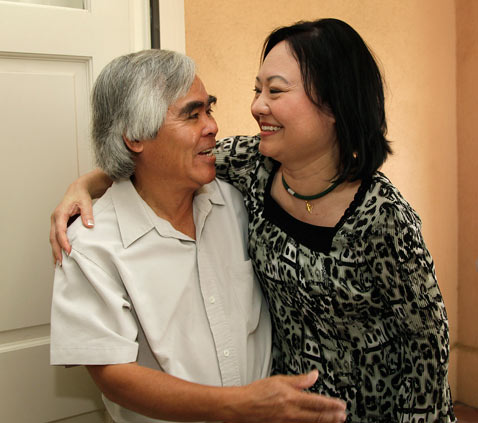
Kim Phuc, right, hugs Associated Press staff photographer Nick Ut, who she calls "Uncle," during a reunion in Buena Park, Calif., June 2, 2012. Ut is currently a Los Angeles-based Associated Press photographer and, in 1997, Kim Phuc established the first Kim Phuc Foundation in the U.S. with the aim of providing medical and psychological assistance to child victims of war. She currently resides in Canada. (Jae C. Hong/AP Photo)
More stories and Interviews Here at ABC7.com L.A.